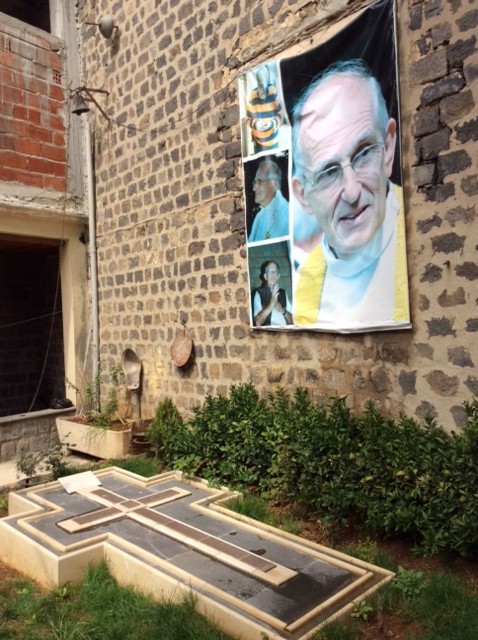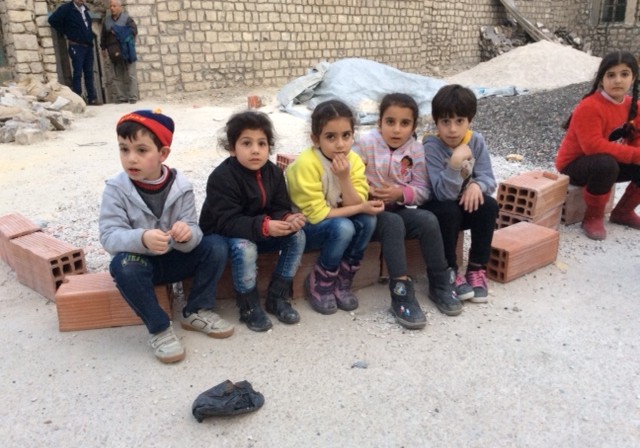April 7, 2016
The city of Homs in western Syria, is the third largest city of the country after Aleppo in the north and the capital Damascus about 170 kilometres to its south. Its population consisting of Arabs, Sunni Muslims, Alawites and Christians- reflected the religious diversity of Syria. The city has a number of historic mosques and churches and is not far from the Krak des Chevaliers castle, a world heritage site.
Today Homs is a devastated city: bombed, battered and bruised by five years of a bloody civil war. Thousands have fled their homes to Damascus and even abroad. Many from here have died. For those who stay on in the midst of ruins, skeletal bombed-out buildings in a ghost-town, there is a feeling of hopelessness, of not knowing what to do and where to go. The children smile-but they seized with a fear which is palpable: those five years and below only know war. The youth talk aimlessly-searching for ways and means to escape from a world of hopelessness. The adults are still tongue-tied for any meaningful conversation. Many of them just want to wake up from what they hope –is just a bad dream. Sadly, enough, the tragedy which has gripped their lives is real!
However, there is a sudden change in the moods of the adults and youth when they talk of one man: Fr. Frans van der Lugt. Their eyes light up, a sense of nostalgia envelops them, as they latch on to the person and message of this great human; because he still lives on in their hearts and minds, some of them do feel that there will be a new dawn!
Who was this ‘Abouna Frans’ as he was fondly referred to? Fr Frans van der Lugt, was a Dutch Jesuit priest who devoted his life to the people of Syria; when civil war erupted there in 2011 he chose to remain in the country, suffering the shortages and terrors of the conflict alongside both Muslims and Christians. He was born on April 10 1938 in The Hague, Netherlands- the son of a banker. He joined the Jesuits in 1959 and seven years later went to the Middle East. With the exception of a short break to complete his doctorate in Psychology, he spent the rest of his life from 1976 in Syria. In Homs he founded the Al-Ard institute, where handicapped children of all religions and ethnic groups found a home –of warmth and acceptance.
His twilight years however were shattered with the civil war. As the fighting intensified, Fr Frans moved to the Jesuit residence in Boustan –Diwan (the inner city). From there he shared the suffering of the inhabitants, refusing to leave, even as that part of the city continued to be bombed from all sides. His centre before long became a home for those who had nowhere to go: Muslims and Christians; women and men; old and young. It was a haven for them and Fr Frans was their refuge. His message to all was one of hope: of mercy and reconciliation, of justice and of peace! Listening to those who knew him, those who experienced his warmth, his love, his courage to give “all-of-himself” to those in need- would easily touch a heartless person.
Because there were several rebels in the old city- that part was under siege. There were no food supplies coming in nor were people being allowed in or out. Though a relatively ‘normal’ life continued just streets away, in the government-held zones, starvation was claiming lives in the rebel enclave. Fr Frans existed on olives and broth fortified with weeds picked off the streets. “The faces of people you see in the street are weak and yellow,” he told a journalist “Their bodies are weakened and have lost their strength.” With his training in psychology, he documented the spread of mental illness among those who found themselves besieged: “I try to help them not by analysing their problems, as the problems are obvious and there is no solution for them here. I listen to them and give as much food as I can.”
Frans was a healer – he touched the broken spirits of a battered people; he did not care for himself, if someone was physically sick, he did all he could (with the little he had) to make them well again. His forte however, was to soothe the mental and the spiritual suffering they were going through. They sought his guidance and his direction- when they overwhelmed by the brutality around them.
Very ironically he was gunned down on World Health Day, April 7, 2014, by those who felt that this healer had no right to live to heal the brokenness of Homs and Syria. It was just three days before what would have been his 76th birthday. On hearing about his tragic death Muslims and Christians came together despite the hostilities around them – to bury him in the compound of the Jesuit Centre.
Fr Frans is revered as a Saint today by both Muslims and Christians. His tomb is visited today by people from all walks of life. They pray to him: so that he intercedes with his creator that justice and truth triumphs in Syria and in other parts of the Middle-East; for lasting peace and security in the region. They will never forget his words “the Syrian people have given me so much, so much kindness, inspiration and everything they have. If the Syrian people are suffering now, I want to share their pain and their difficulties”. This he did in full measure: he lived with them, he died for them.
On April 9, 2014 Pope Francis at the General Audience in Rome said “last Monday in Homs, Syria, Rev Fr Frans van der Lugt one of my Dutch Jesuit confreres was assassinated at the age 75. He arrived in Syria some 5o years ago and always did good to everyone generously and with love. He was therefore loved and highly esteemed by Christians and Muslims.
His brutal murder has deeply distressed me and has made me think again of the many people who are suffering and dying in that tormented country, my beloved Syria, which for too long has been the prey of a bloody conflict that continues to reap death and destruction. I also think of the many people who have been kidnapped, Christians and Muslims, Syrians and those from other countries, including bishops and priests. Let us ask the Lord that they may soon return to their loved ones and to their families and communities.
From my heart I invite you all to join me in prayer for peace in Syria and the region, and I launch a heartfelt appeal to the Syrian leaders and to the international community: Please, silence the weapons, put an end to the violence! No more war! No more destruction! May humanitarian laws be respected, may the people who need humanitarian assistance be cared for and may the desired peace be attained through dialogue and reconciliation.”
On February 10th 2014 The” Erasmus “blog in The Economist had a powerful article on Fr. Frans entitled ‘A Voice Crying in the Wilderness’- of the courage he demonstrated to tell the world of the pain, hunger and suffering of the people around him; a person who would never desert his people. Two months later the ‘Erasmus’ blog had these very moving words, “by staying in the heart of besieged Homs, during a takeover by rebels who included militant Islamists and then during a government siege, he was offering succour to all victims of the conflict—and a kind of reproach to all the belligerents.
He knowingly risked his life by remaining in a place where some Islamist rebels were active; but he also bore witness to the cruel consequences of the siege by refusing to leave when it would have been so easy to do so, and nobody would have blamed him. From the perspective he offered, all civilian victims were worthy of compassion, and fighters on both sides bore a share of blame. That sounds like a truth worth dying for—and it goes a bit further than religious dialogue.”
In a world torn asunder by violence and hate; by discrimination and divisiveness; by powerful vested interests who do all they can to destroy the lives of ordinary mortals, Fr Frans is a beacon of hope; not only for the people of Syria-for whom he gave up his life- but for people everywhere –who yearn for a new dawn, a better tomorrow. He was relentless in his struggle to establish that better “tomorrow” for his people. He did NOT succeed in that endeavor. Despite the hopelessness and fear that have gripped their lives, many in Homs and in other parts of Syria are convinced that his martyrdom will not go in vain.
5th April. 2016
(Fr Cedric Prakash works with the Jesuit Refugee Service(JRS) in the Middle East. He recently spent some time in Homs, Syria where Fr. Frans lived and died)

